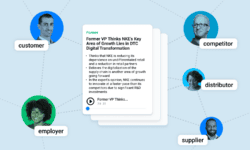As hedge fund managers strive to maintain a competitive edge, generative AI (genAI) is becoming an increasingly prevalent tool in the industry. The technology stands to enhance decision-making processes, optimize trading, and uncover hidden patterns in vast datasets through the use of large language models (LLMs).
The hedge fund industry is exploring several specific use cases for AI tools (such as OpenAi’s chatbot ChatGPT) to enhance the precision and efficiency of trading operations. However, compliance and regulatory concerns remain top of mind.
For example, the use of AI-generated financial reports or investment recommendations can pose transparency and accountability issues. Regulatory bodies require clear documentation and rationale behind investment decisions, which can be challenging to provide with AI-generated content.
For hedge fund managers, several questions arise regarding generative AI tools: How can this technology improve workflows? What are the consequences of integrating genAI into day-to-day workflow? Do the benefits outweigh the risks? Below, we answer all these questions, as well as discuss the use cases and potential challenges of this revolutionary technology.
Use Cases of Generative AI in Hedge Funds
Algorithmic Trading: GenAI is transforming algorithmic trading with the ability to analyze vast amounts of data in real-time. These natural language algorithms can identify patterns and trends that human traders might miss, leading to more accurate and timely trades. By continuously learning from new data, genAI algorithms can also adapt to changing market conditions, enhancing the overall performance of trading strategies.
Market Predictions: Through analysis of historical data and current market conditions, LLM models can forecast future market movements with greater accuracy. These predictions help investment managers make informed decisions about asset allocation, risk management, and investment strategies, ultimately supporting better returns for their clients.
Portfolio Optimization: GenAI can also recommend optimal portfolio compositions by analyzing a wide range of factors, including market trends, economic indicators, and individual asset performance. This ensures that hedge funds maintain a balanced and diversified portfolio, minimizing risk while maximizing returns.
Data Augmentation and Enhancement: Data is the lifeblood of hedge funds, and generative AI can play a crucial role in data augmentation and enhancement. By generating synthetic data, hedge funds can backtest trading strategies and models more effectively. Additionally, genAI can clean and enrich existing datasets, providing more accurate and comprehensive information for decision-making processes.
Regulatory Compliance: GenAI can assist in ensuring compliance with regulatory requirements by monitoring and analyzing transactions for any signs of non-compliance, thereby reducing the risk of regulatory penalties.
Benefits of Generative AI in Hedge Funds
Utilizing generative AI in hedge funds presents the following benefits:
Improved Decision-Making
Certain datasets possess intricate patterns that, while filled with potentially lucrative information, are complex and time-consuming to break down. GenAI can quickly extract actionable insights from datasets that inform investment strategies, leading to more accurate and timely decisions that drive better returns and ultimately improve the performance of assets under management (AUM).
Increased Efficiency
GenAI can automate processes that reduce the time and effort required for data analysis, trading, and portfolio management. This allows hedge fund managers to focus on strategic planning and high-value tasks, thereby increasing overall productivity.
Risk Management
Spotlighting vulnerabilities in investment processes and portfolios is crucial to maintaining a reliable reputation as a hedge fund. Through continuous monitoring and analysis, generative AI models can predict market fluctuations and recommend risk mitigation strategies. This proactive approach helps hedge funds minimize losses and improve investment strategies.
Optimized Trading Strategies
AI-driven strategies can adapt to market changes in real-time, allowing hedge funds to capitalize on emerging opportunities and avoid asset management pitfalls. This dynamic approach enhances trading performance and profitability.
GenAI can also provide insights into asset allocation, diversification, and performance optimization. By analyzing a wide range of factors, generative AI can recommend the best portfolio compositions, ensuring that hedge funds maintain a balanced and diversified portfolio that maximizes returns while minimizing risk.
Cost Reduction
The adoption of generative AI leads to significant cost reductions in hedge fund operations. Automated processes reduce the need for manual intervention, lowering operational costs. Additionally, generative AI can identify inefficiencies and recommend cost-saving measures, further enhancing the financial health of funds.
Competitive Advantage
Hedge funds that leverage generative AI gain a competitive advantage in the market with the ability to make informed decisions, optimize trading strategies, and manage risks more effectively. This competitive edge attracts more investors and drives long-term success for the firm.
Scalability
GenAI offers scalability, allowing hedge funds to handle larger volumes of data and transactions without compromising performance. As hedge funds grow, they can seamlessly scale operations that were once laborious processes (for example, analyzing extensive market data to predict trends, automate trading strategies, and enhance risk management through real-time portfolio monitoring) so as to ensure that they continue to operate efficiently and effectively, regardless of size.
Regulatory Compliance
Generative AI assists hedge funds in maintaining regulatory compliance by monitoring transactions and identifying potential non-compliance issues. This proactive approach ensures that managers adhere to regulatory requirements, reducing the risk of penalties and enhancing their reputation in the market.
Innovation and Creativity
By automating routine tasks and providing deep insights, generative AI frees up time for hedge fund managers to explore new investment opportunities and develop innovative strategies. This culture of innovation drives continuous improvement and long-term success.
Challenges of Generative AI in Hedge Funds
Utilizing generative AI in hedge funds poses several challenges and risks, which must be addressed for optimal results.
Poor Data Quality Resulting in Inaccurate Predictions and Bad Decisions
One of the significant challenges of implementing generative AI in the investment industry is ensuring that the model is trained only on high-quality data . Poor data quality can lead to inaccurate predictions and suboptimal decision-making. Inconsistent, incomplete, or biased data can skew AI models, resulting in flawed insights and potentially costly investment errors. Ensuring data integrity and accuracy is paramount to leveraging the full potential of genAI.
Lack of Transparency
It can be difficult to interpret generated responses, which poses a challenge for hedge funds. The lack of transparency in AI can raise issues with regulators who require clear documentation and rationale behind investment decisions. This “black box” nature of AI—where algorithms pull in information from various, potentially unvetted sources to generate responses—can make it challenging to explain and justify decisions to stakeholders, potentially leading to compliance issues and erosion of trust.
Reputational Concerns
The use of genAI raises potential reputational concerns, such as data privacy, algorithmic bias, and the potential for market manipulation. Hedge funds must navigate these risks and ensure their AI practices are compliant to maintain their reputation and avoid legal repercussions.
Security Risks
Generative AI systems are not immune to security risks. Cyberattacks, data security threats, and breaches can compromise sensitive financial data and disrupt operations. Hedge funds must invest in robust cybersecurity measures to protect their AI systems and data from malicious actors. Ensuring the security and integrity of AI systems is crucial to maintaining investor confidence and operational stability.
Balancing the Use of Technology
While generative AI offers numerous benefits, over-dependence on technology can create potential blind spots in risk management. Relying too heavily on AI-driven insights may lead to the neglect of traditional risk assessment methods and undervaluing of human judgment. Additionally, continuously investing in upgrading AI systems can be costly and resource-intensive. Hedge funds must strike a balance between leveraging AI and maintaining a holistic approach to risk management that incorporates both technological and human elements.
Best Practices for Generative AI in Hedge Funds
Hedge funds can enhance their readiness for generative AI by engaging in the following best practices:
Investing in Data Infrastructure
To fully harness the potential of genAI, hedge managers must invest in robust data infrastructure. This includes acquiring high-quality vetted data sources, implementing advanced data management systems, and ensuring data integrity. By building a solid foundation for data collection, storage, and processing, hedge funds can build their AI models with the accurate and comprehensive data needed to generate reliable insights.
Building a Skilled AI Team
A critical step in integrating generative AI is assembling a skilled AI team. Hedge funds should consult with data scientists, AI experts, and machine learning engineers who possess the technical expertise to develop and manage AI models. Additionally, training existing employees on integrating AI technologies is essential. Fostering a culture of continuous learning and development is paramount to ensuring a workforce is equipped to leverage AI effectively.
Choosing the Right Technology
Ultimately, hedge funds must carefully evaluate whether to build or buy AI technology. Building custom AI solutions can offer tailored capabilities that align with specific business needs, but it requires significant investment of time and resources. Alternatively, purchasing off-the-shelf AI solutions can provide quicker implementation and access to proven technologies. Hedge funds should assess their unique requirements, budget, and long-term goals to make informed decisions about their AI technology strategy.
Implementing Strong Governance
Strong governance is crucial for the successful integration of genAI. Establishing clear policies and procedures for AI development, deployment, and monitoring ensures that AI initiatives align with regulatory requirements and ethical standards. Governance frameworks should address data privacy, algorithmic transparency, and accountability, and they should provide a structured approach to managing AI risks and maintaining compliance.
Pilot Programs
Before fully integrating generative AI into their operations, hedge funds can benefit from running pilot programs. These small-scale initiatives allow hedge funds to test AI models in a controlled environment, evaluate their performance, and identify potential challenges. Pilot programs provide valuable insights into the practical applications of AI and help hedge funds refine their strategies before committing to full-scale implementation. Pilot programs can teach hedge funds how to mitigate risks and enhance the effectiveness of their AI initiatives.
Take Advantage of Generative AI with AlphaSense
Investment managers are in a unique position to take an early lead in the adoption of generative AI technology and actively influence the future of finance.
However, it is crucial to recognize that we are currently deep in the hype cycle surrounding generative AI. Without understanding the limitations and potential consequences of using this technology, a company can quickly run their operations amuck if no training or vetting is put in place. Given this context, industry leaders must redirect their attention towards pinpointing the specific areas where this state-of-the-art technology can benefit their workloads by following the best practices of integrating genAI and addressing the risks and challenges it can pose .
Those who adeptly navigate this pivotal decision-making process and align it with their strategic objectives will undoubtedly emerge as frontrunners. By doing so, they position themselves ahead of the curve, ready to capitalize on the true commercial potential of generative AI as the hype inevitably subsides and its real impact on the industry unfolds.
AlphaSense Enterprise Intelligence enables secure searches, summaries, and follow-up questions across your proprietary internal data and a vast repository of 300M+ premium external documents—all powered by our industry-leading genAI for market intelligence.
Already, over 1,300 AlphaSense customers have integrated their proprietary internal content alongside our premium external market intelligence and are leveraging our industry-leading search, summarization, and monitoring tools. Our best-in-class search technology saves time by delivering and summarizing the most relevant results across all their proprietary internal content and hundreds of millions of premium external documents.
As a platform purpose-built to drive the world’s biggest business and financial decisions, our first iteration of Gen AI technology—Smart Summaries—leverages our 10+ years of AI tech development and draws from a curated collection of high-quality business content.
Smart Summaries provides instant overviews of multiple perspectives on a topic—from earnings calls and Wall Street analysis to interviews with industry experts—allowing users to quickly hone in on the exact information they need, and easily verify that information from the source material itself.
Most importantly, Enterprise Intelligence meets the highest industry standards—including SOC2, ISO270001 compliant, regular, accredited third-party penetration testing, FIPS 140-2 standard encryption on all content, and SAML 2.0 integration. AlphaSense not only speeds up your internal knowledge search, but ensures privacy and security from external malicious forces.
Check out this case study to learn how ODDO BHF, one of the largest private banks in Germany, used AlphaSense and its genAI capabilities to streamline insights and get the competitive edge.
Start your free 2-week trial today to explore the AlphaSense platform firsthand and see how it can raise your organizational IQ.
.png)







